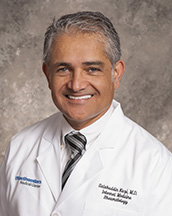Summary Report: Spring 2021 Rheumatology Board Meeting
June 3, 2021 | Posted by ABIM | Uncategorized
Spring 2021 Meeting
The Rheumatology Board met virtually on March 23, marking approximately one year since the beginning of the COVID-19 pandemic. In this period physicians in internal medicine and its subspecialties have been greatly affected by the novel coronavirus. Additional stress was placed not only on them personally, but the entire health care system as well. While the societal impact of the pandemic was a topic of conversation throughout the Specialty Board meeting, the eight members of the Rheumatology Board also addressed many other important issues facing the discipline.
Below is a recap of the key discussion topics from the meeting:

Leadership Update
Richard J. Baron, MD, ABIM President and CEO, joined the Rheumatology Board and highlighted ABIM’s response to the pandemic in light of the additional burdens it has placed on so many physicians. After announcing in May 2020 that no one would lose certification if they weren’t able to complete a Maintenance of Certification (MOC) requirement that year, ABIM made a similar decision with a March 2021 announcement that deadlines for MOC requirements would be extended until the end of 2022. This means:
- Physicians that have an assessment, attestation or points due in 2020 or 2021 will now have until 12/31/22 to complete them.
- Those who due for an assessment in 2020, 2021 or 2022 will be able to participate in the Longitudinal Knowledge Assessment (LKA) when it launches in their specialty.
- Rheumatology launches in 2022; see the full LKA availability and rollout schedule.
- All ABIM assessments will be offered as scheduled this year to allow physicians the flexibility to take an assessment if they would like to take one, even though it is not required.
- The Knowledge Check-In will not be offered after 2021.
Dr. Baron referenced information that was subsequently shared with all ABIM diplomates in the Spring 2021 News and Notes, including his message to ABIM diplomates acknowledging the challenges that the pandemic has wrought on the physician community.
Dr. Baron elaborated on ABIM’s response to COVID-19 and illustrated the important role board certified physicians play as trusted voices in medicine. One example can be seen by numerous ABIM Governance members sharing their vaccination ‘selfies’ on social media through the #MyCOVIDVax campaign. Read their stories on the ABIM blog.
Dr. Baron also reflected on another pillar of ABIM’s strategic efforts in 2021: Diversity, Equity and Inclusion (DEI). He connected the nation’s negative health outcomes caused by the novel coronavirus and the disturbing reality of health disparities in Black and Brown communities that are now being further exacerbated by the pandemic, and stressed the important role ABIM and the ABIM Foundation play in addressing these issues. He referenced the organization’s joint Statement on Racial Justice issued in summer 2020 and the tangible next steps to realize this vision, including a grant program to build trust and equity in internal medicine training.
Diversity, Equity and Inclusion: Opportunities for Collaboration and Advancement
Donna Hoyne, Vice President of Education at the American College of Rheumatology (ACR), and Carol Langford, MD, Member of the ACR Board of Directors, were guests at the meeting and provided an update on recent society developments, including the creation of a Diversity and Inclusion Task Force. They also shared novel ways that ACR is looking to improve educational activities and referenced the development of a diversity training that will be offered at ACR’s Annual Meeting later in 2021. The diversity training will also offer MOC points, and Ms. Hoyne identified educational offerings like this as an area in which ACR could potentially collaborate with ABIM in the future.
Echoing Dr. Baron’s earlier report, ABIM’s Senior Vice President of Communications and Chief Diversity, Equity and Inclusion Officer, Pamela Browner White, stressed ABIM’s commitment to addressing racism and structural inequalities by integrating DEI into all facets of ABIM both as a professional standard setting organization and as an employer. She was joined by Lorna Lynn, MD, Vice President for Medical Education Research and the Staff Administrator for the Diversity, Equity and Inclusion Committee, with representation from ABIM’s Board, Council, Exam Committees, and ABIM Foundation’s Board of Trustees.
After brief presentations, Ms. Hoyne, Dr. Langford, Ms. White, Dr. Lynn and the Rheumatology Board engaged in a conversation framed around a number of questions:
1) What are the opportunities for collaboration with other organizations around diversity, equity and inclusion?
2) With respect to race and ethnicity, what is the composition of the workforce in the field? How can the specialty recruit and retain a more diverse physician workforce, to better serve patients?
3) What are the known inequities in health and health care in the specialty? What role can ABIM play in mitigating these inequities?
The ensuing discussion focused largely on workforce opportunities, including outreach to diverse audiences early on in careers and perhaps even at the high school or undergraduate level to expand the pipeline of future rheumatologists.
Specialty Board members who previously served on ABIM’s Rheumatology Exam Committee emphasized the importance of considering race and ethnicity biases when writing ABIM test questions. Lupus was highlighted as a disease that disproportionately affects minorities; members discussed the difficulty in not considering race/ethnicity in lupus-related questions, and stressed that we need to approach these issues in a very thoughtful, evidence-based way guarding against bias where possible. As ABIM further explores the concept of developing assessment questions related to health equity, members noted that it would send a very strong signal to residency programs to make DEI part of the curriculum that prepares residents to be board certified physicians.
There was general consensus from all in attendance that this was only the beginning of these conversations, and ABIM looks forward to exploring the issues further with its many society partners during the Internal Medicine Summit that will be held virtually in June. This annual meeting brings together high-level leaders from numerous professional societies – including ACR – to discuss pressing issues in the IM community. At this year’s Summit, ABIM and its society guests will be exploring the topic of DEI and how the various stakeholders can collaborate in this area to amplify collective impact.
Discussion of Future Specialty Board Membership
The Rheumatology Board dedicated considerable time to discussing the qualifications of the many outstanding candidates that applied for Specialty Board membership. Throughout this process, special care was given to ensure that new members enhance the group’s diversity in terms of age, gender, race/ethnicity, geographic location and practice type. Specialty Board members are ultimately chosen by the ABIM Council, whose members have oversight of Specialty Board composition across ABIM disciplines.
ABIM Research Update
ABIM Senior Vice President of Assessment and Research, Rebecca Lipner, PhD, and team shared ABIM’s research strategy that was developed by a joint Board of Directors–ABIM Council Research Strategy Subcommittee composed of Vineet Arora, MD, Seth Landefeld, MD and Susan Edgman-Levitan. The strategy outlines three broad areas for ABIM to focus its efforts:
- Foundational Science
- External Validation Studies
- Public Awareness Research
The recent research of Dr. Lipner’s team sought to better understand trends in healthcare and how MOC performance is linked with better patient care. Read more about recently published research on ABIM’s blog, including the following articles:
- Critical Care Medicine Journal: Critical Care Physicians Treating COVID-19 Patients Report Continued High Levels of Stress and Staff and PPE Shortages
- Academic Medicine: Gender Differences in Milestone Ratings and Medical Knowledge Examination Scores Among Internal Medicine Residents
- BMJ Open: The Association Between Primary Care Physician Diagnostic Knowledge and Death, Hospitalization and Emergency Department Visits Following an Outpatient Visit at Risk for Diagnostic Error: A Retrospective Cohort Study Using Medicare Claims
The Specialty Board was asked for ideas about research that could be done on health care outcomes in rheumatology to explore further links between board certification status and patient care.
Longitudinal Knowledge Assessment (LKA): Communications and Governance Engagement Update
ABIM Communications staff joined the meeting to share new developments on the name, branding and a preview of forthcoming communications in support of the longitudinal assessment, which will launch in Rheumatology in 2022. In early April ABIM announced the official name of new assessment option – the Longitudinal Knowledge Assessment (LKATM) – via its quarterly newsletter distributed to more than 215,000 diplomates. In addition to the name, ABIM also revealed LKA-specific branding and imagery, along with a new mini website available at abim.org/lka. ABIM Governance members are featured prominently on the new site and in supporting materials in an effort to deepen connections between ABIM and the internal medicine community.
Specialty Board members and staff then discussed how ABIM Governance can help get the word out to their colleagues about the positive changes to come. Some members shared their experience engaging with the community on behalf of ABIM through participation in activities such as Grand Rounds or presentations at society meetings, and they revealed tips on proven tactics to effectively reach rheumatologists.
Specialty Board Oversight of Discipline-Specific Assessments
Specialty Boards serve as the governing body that has oversight of the assessments and Exam Committees in their discipline, and have the responsibility of periodically approving the assessment blueprints and standards for Certification and MOC. At this session, staff from the ABIM Assessment and Research team presented members with workforce information for their specialty, training pipeline trends, and assessment outcome trends, to better inform future decisions related to assessments.
In Closing
The Rheumatology Board values the feedback and commentary of the entire medical community, including diplomates and society partners.
Do you have any questions? Are you interested in how to get involved?
If you have questions after reading this report, please connect with us through the following channels:
- Subscribe to the ABIM blog
- Call:1-800-441-ABIM (2246)
- Email: request@abim.org
- Join our Governance to help guide our future direction
- Join our Community Insights Network to share your feedback.



